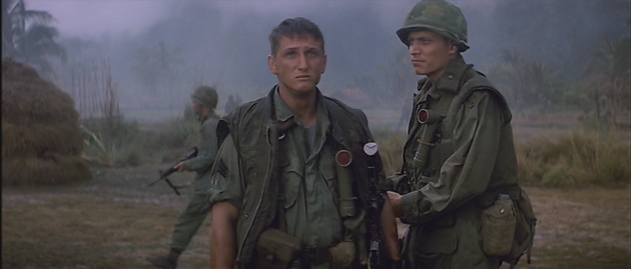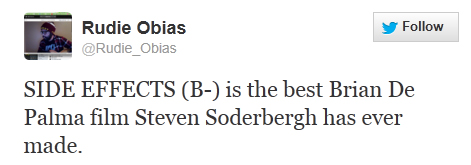
 Hello and welcome to the unofficial Brian De Palma website. Here is the latest news: |
|---|
E-mail
Geoffsongs@aol.com
-------------
Recent Headlines
a la Mod:
Listen to
Donaggio's full score
for Domino online
De Palma/Lehman
rapport at work
in Snakes
De Palma/Lehman
next novel is Terry
De Palma developing
Catch And Kill,
"a horror movie
based on real things
that have happened
in the news"
Supercut video
of De Palma's films
edited by Carl Rodrigue
Washington Post
review of Keesey book
-------------
Exclusive Passion
Interviews:
Brian De Palma
Karoline Herfurth
Leila Rozario
------------
------------
| « | January 2013 | » | ||||
| S | M | T | W | T | F | S |
| 1 | 2 | 3 | 4 | 5 | ||
| 6 | 7 | 8 | 9 | 10 | 11 | 12 |
| 13 | 14 | 15 | 16 | 17 | 18 | 19 |
| 20 | 21 | 22 | 23 | 24 | 25 | 26 |
| 27 | 28 | 29 | 30 | 31 | ||
De Palma interviewed
in Paris 2002
De Palma discusses
The Black Dahlia 2006

Enthusiasms...
Alfred Hitchcock
The Master Of Suspense
Sergio Leone
and the Infield
Fly Rule
The Filmmaker Who
Came In From The Cold
Jim Emerson on
Greetings & Hi, Mom!
Scarface: Make Way
For The Bad Guy
Deborah Shelton
Official Web Site
Welcome to the
Offices of Death Records
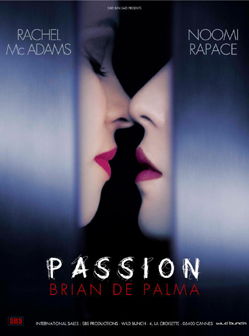 The Genres Next Door monthly film club presents a premiere in Brussels, Belgium, of Brian De Palma's Passion on February 7. According to its website, Genres Next Door's monthly film club projects films that explore different sexualities and minority lifestyles through films that would otherwise see little or no distribution in Belgium. Tweets from Dutch journalists indicate that De Palma has been doing more interviews ahead of the premieres in Belgium and France (Feb. 13). Lindsey of Rachel McAdams Online tells us that Algemeen Dagblad is one of the biggest Dutch journalists. His tweet, according to Lindsey, says that he has finished writing up his interview with De Palma, and that he hopes that Passion will make it to Dutch theaters, which is not the case in all countries. "Unjustified!" he writes. And if you speak Dutch, you can listen to (and understand) an interview with Ghent Film Festival director Patrick Duynslaegher, discussing De Palma, at Radio 1. (Big thanks to Lindsey for steering us in the right direction on that, too!)
The Genres Next Door monthly film club presents a premiere in Brussels, Belgium, of Brian De Palma's Passion on February 7. According to its website, Genres Next Door's monthly film club projects films that explore different sexualities and minority lifestyles through films that would otherwise see little or no distribution in Belgium. Tweets from Dutch journalists indicate that De Palma has been doing more interviews ahead of the premieres in Belgium and France (Feb. 13). Lindsey of Rachel McAdams Online tells us that Algemeen Dagblad is one of the biggest Dutch journalists. His tweet, according to Lindsey, says that he has finished writing up his interview with De Palma, and that he hopes that Passion will make it to Dutch theaters, which is not the case in all countries. "Unjustified!" he writes. And if you speak Dutch, you can listen to (and understand) an interview with Ghent Film Festival director Patrick Duynslaegher, discussing De Palma, at Radio 1. (Big thanks to Lindsey for steering us in the right direction on that, too!)
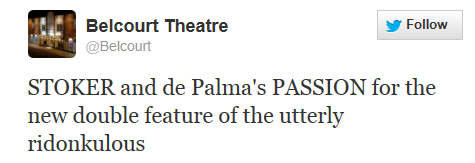
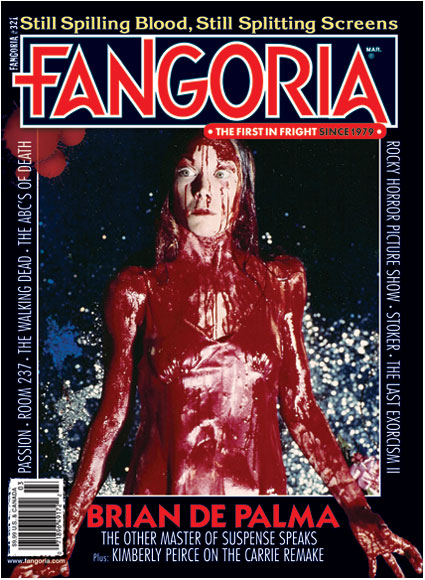 Fangoria has posted a preview of the cover and contents of next month's issue, with a big cover story on Brian De Palma. Here are a few highlights listed from the upcoming issue:
Fangoria has posted a preview of the cover and contents of next month's issue, with a big cover story on Brian De Palma. Here are a few highlights listed from the upcoming issue:INTERVIEW: BRIAN DE PALMA From “Sisters” to “Carrie” to the new “Passion,” he’s been thrilling us in the most stylish ways. Plus: horrific highlights from decades of De Palma.
FEATURE: THE “PASSION” MASK How to make a face that suits two of the screen scene’s most accomplished actresses.
INTERVIEW: P.J. SOLES She turned a small part in “Carrie” into a memorable mean girl. Plus: Pino Donaggio and William Katt on making beautiful music with Carrie.
PREVIEW: “CARRIE” She’s headed for the prom again this year, and director Kimberly Peirce is chaperoning.
FIRST RITES “Carrie” on through the changes
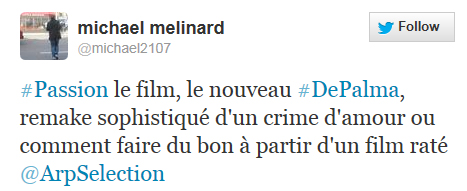
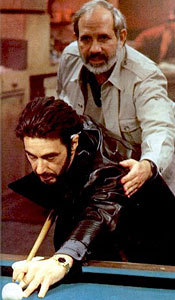 Thanks to Greg Srisavasdi at Hollywood Outbreak for reminding us that, back in 1997, Al Pacino had been in talks for the part of Kevin Dunn in Brian De Palma's Snake Eyes. Pacino eventually turned it down, and Gary Sinise ended up taking on the role opposite Nicolas Cage (Will Smith had also flirted with that project). But there is another little-known project that De Palma and Pacino had tried to put together way before Scarface.
Thanks to Greg Srisavasdi at Hollywood Outbreak for reminding us that, back in 1997, Al Pacino had been in talks for the part of Kevin Dunn in Brian De Palma's Snake Eyes. Pacino eventually turned it down, and Gary Sinise ended up taking on the role opposite Nicolas Cage (Will Smith had also flirted with that project). But there is another little-known project that De Palma and Pacino had tried to put together way before Scarface.Guare's Cop-Out is a surreal play in which two policemen, one in uniform and one in plainclothes, are played by the same actor, who interchanges (amidst stage blackouts and musical cues) between the two counterpoints of straight-laced police work (the stuttering uniformed one) and noirish absurd fantasies (the smooth and cocky plainclothes one). Each man interacts with a woman, the only other performer in the piece, and she alternates along with him. At one point, the plainclothes cop is drawn into an avant-garde play (a play-within-the play) which finds him under the covers, servicing Marilyn Monroe under the guise of several U.S. presidents, from Washington to Lincoln to Roosevelt, etc. The actor pops up from under the covers to deliver each president's gag-line as Groucho Marx might (complete with cigar), singing crude songs, etc.
The driving "plot" of the play is a whodunnit detective story, with a marked contrast between the cops who, played by the same actor, seem like two sides of the same personality. This aspect, of course, would have fit right in with the types of films De Palma would go on to make throughout his career, and it seems likely he might have envisioned some sort of split-screen for the film version, having just finished the split-screen Dionysus In '69. It certainly would have been an interesting film.
DE PALMA AUDIO SNIPPET
While you're at the Hollywood Outbreak link, check out Srisavasdi's snippet of audio from an interview he did with De Palma for Femme Fatale a little over a decade ago, in which the director talks about leaving enough room in a screenplay to allow for visual design. Great stuff!
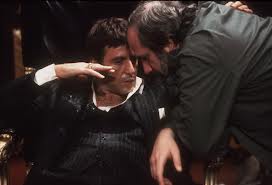 Well, I thought there was some reason Brian De Palma had suddenly dropped out of the Jason Statham Heat remake a few weeks ago. Looks like he was cooking up something big with two of his old friends. Deadline's Mike Fleming broke the news today that De Palma will reteam with Al Pacino for Happy Valley, "the working title of a film that will tell the story of Penn State head football coach Joe Paterno," according to Fleming. The focus of the film is being kept under wraps for now, but Fleming writes that "Paterno’s legend was undone by revelations he and others in the football program were aware that former defensive coordinator Jerry Sandusky was molesting children, and did little to stop it, supposedly fearing bad publicity for the powerhouse gridiron program they presided over."
Well, I thought there was some reason Brian De Palma had suddenly dropped out of the Jason Statham Heat remake a few weeks ago. Looks like he was cooking up something big with two of his old friends. Deadline's Mike Fleming broke the news today that De Palma will reteam with Al Pacino for Happy Valley, "the working title of a film that will tell the story of Penn State head football coach Joe Paterno," according to Fleming. The focus of the film is being kept under wraps for now, but Fleming writes that "Paterno’s legend was undone by revelations he and others in the football program were aware that former defensive coordinator Jerry Sandusky was molesting children, and did little to stop it, supposedly fearing bad publicity for the powerhouse gridiron program they presided over." Last September, Fleming reported that Pacino was attached to play Paterno. At that time, Nicita was named as the producer, and the project was being shopped around. In that September post, Fleming wrote, "The narrative arc of the movie that will be shopped is obvious. A man becomes the winningest coach in college football history and builds a powerhouse football program that turns him into a campus deity. When his former defensive coordinator Jerry Sandusky is revealed to be a pedophile and it comes out Paterno was told and helped hide the scandal, the coach was summarily fired. He died shortly after of cancer — and many feel of a broken heart — and the school had little choice but to raze a fabled statue of Paterno just as the NCAA dropped the hammer with sanctions against the school that included removal of Paterno’s wins going back to the cover-up. Sandusky was found guilty on 45 counts of sexual abuse against young boys and is expected to spend the rest of his life in prison."
Last September, Fleming reported that Pacino was attached to play Paterno. At that time, Nicita was named as the producer, and the project was being shopped around. In that September post, Fleming wrote, "The narrative arc of the movie that will be shopped is obvious. A man becomes the winningest coach in college football history and builds a powerhouse football program that turns him into a campus deity. When his former defensive coordinator Jerry Sandusky is revealed to be a pedophile and it comes out Paterno was told and helped hide the scandal, the coach was summarily fired. He died shortly after of cancer — and many feel of a broken heart — and the school had little choice but to raze a fabled statue of Paterno just as the NCAA dropped the hammer with sanctions against the school that included removal of Paterno’s wins going back to the cover-up. Sandusky was found guilty on 45 counts of sexual abuse against young boys and is expected to spend the rest of his life in prison."
Fleming was soon flooded with e-mails, and updated the post with this:
"The administration at Penn State chose to protect its cherished powerhouse and lucrative football program, and went against the contract that any institution of higher learning has, which is to protect the young and vulnerable. The idea that this just somehow happened, and nobody but Sandusky was to blame, is something I will never embrace. Had that been the case, I doubt the university would have fired Paterno and later torn down his statue, or that the NCAA would have leveled devastating sanctions against the football program at the expense of current players who had absolutely nothing to do with any of this and who didn’t deserve punishment that was delivered to send a clear message about prioritizing what is important. Regretfully, that is Paterno’s enduring legacy now. But keep the emails coming!"
"There are so many themes to deal with here, from Paterno’s rise and his loyalty to a football program he spent his life building, to the obvious question of how a molder of young men could possibly have stood silently by when told that one of his former coaches started a charity for underprivileged kids and used it as a way to ingratiate himself into vulnerable young fatherless boys for sexual encounters? The failure of Paterno and university officials to act allowed Sandusky to continue molesting boys for years, which was borne out in court testimony leading to his conviction and incarceration. Posnanski was working on a book about Paterno and was well into it when the scandal broke. The book is as much about what made Paterno tick as anything else, and capturing complex characters is something Pacino does well. He played a conflicted pro football coach in Any Given Sunday, and Jack Kevorkian in the HBO film You Don’t Know Jack."

At the start of his post on the film, Prime writes, "In 1987, Brian De Palma and iconic key collaborators including spitfire screenwriter David Mamet and legendary composer Ennio Morricone, set out to realize a historical crime epic like none other. De Palma is a larger than life director known to embrace bold stylistic choices, Mamet writes dialogue that comes out of some kind of curse-laden meta-reality, and Morricone’s score contains in itself a storybook quality, that every moment is deliberately crafted to dramatize history, to realize a respectful spectacle."
 Last week, Ryan Murphy answered some questions about the latest episode of American Horror Story: Asylum for Entertainment Weekly's Tim Stack. Below are the first few questions of the interview:
Last week, Ryan Murphy answered some questions about the latest episode of American Horror Story: Asylum for Entertainment Weekly's Tim Stack. Below are the first few questions of the interview:I loved that location. And that’s a real mausoleum?
Yes.
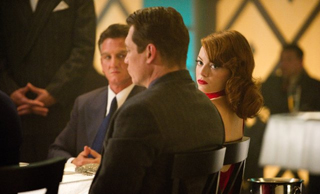 I went to see Gangster Squad today. It's a pretty good movie, and definitely pulls shot ideas from De Palma's The Untouchables, as well as other gangster movies (and the slow-motion scene in which Ryan Gosling's character turns and decides he is going to go after Mickey Cohen after all reminded me of the great Kirk Douglas slow-motion anger gun march in the big set-piece of De Palma's The Fury). In all fairness to director Ruben Fleischer, it is obvious that if he pulled from any of these shots, they are just blips in a movie he has made his own way. Gangster Squad could have been a weightier film under a different director, with this great cast and this script, but as it stands, it is a fast-paced entertainment that, while it sometimes feels a bit too slick for its own good, still manages to satisfy.
I went to see Gangster Squad today. It's a pretty good movie, and definitely pulls shot ideas from De Palma's The Untouchables, as well as other gangster movies (and the slow-motion scene in which Ryan Gosling's character turns and decides he is going to go after Mickey Cohen after all reminded me of the great Kirk Douglas slow-motion anger gun march in the big set-piece of De Palma's The Fury). In all fairness to director Ruben Fleischer, it is obvious that if he pulled from any of these shots, they are just blips in a movie he has made his own way. Gangster Squad could have been a weightier film under a different director, with this great cast and this script, but as it stands, it is a fast-paced entertainment that, while it sometimes feels a bit too slick for its own good, still manages to satisfy.